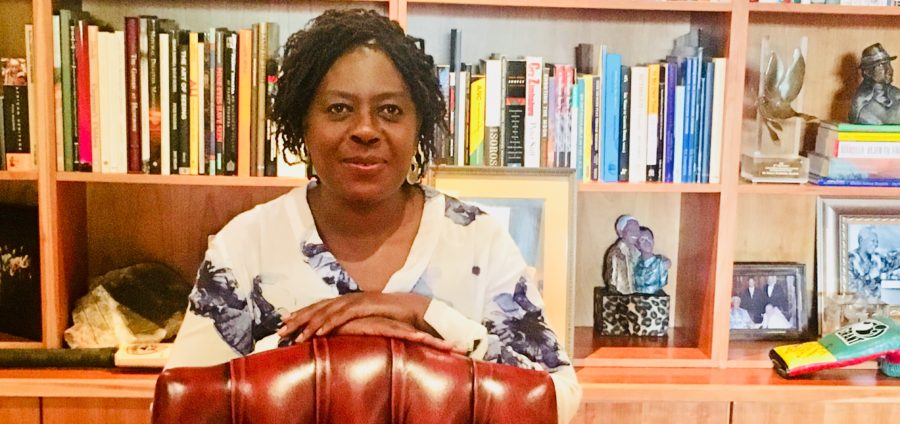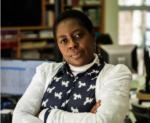7th June 2019
Reporting from the frontline

Long-time Southern African regional correspondent Susan Njanji from Zimbabwe was one of very few black African female journalists to cover the genocide in Rwanda. Here she reflects on the challenges that she’s faced when reporting from the frontline as a woman – and why gender should never be a factor in deciding who gets the best assignments.
‘It’s possible for women to work anywhere’
Unlike some of my professional colleagues, I have been very fortunate to work in a progressive news organisation, Agence France-Presse. In most cases I have been volunteered to go on assignments. For example my first foreign trip was to cover the Angolan civil war. I was one of the very few black African female journalists to cover the genocide in Rwanda (April – July 1994). I took it that gender was not a factor when it came to deciding on who to assign where. It is just a question of who can get the jobs done efficiently. The point is that it is possible for women to work anywhere regardless of the assignment.
Frontline coverage of conflicts can present challenges. For me that Rwanda stint probably presented the toughest conditions. I slept in a hotel room with no windows, doors with no locks, no bedding, no water. Any woman will know how difficult it is to have no ablution facilities when you are menstruating. It felt like I was living outside on the streets. My worst fear was sexual attacks. My jean pants became my pyjamas. So for weeks I slept in my jeans. I slipped into them and zipped myself up in them inside a sleeping bag. I also felt I was treated suspiciously by the Rwanda army simply because I was black and a woman. I got the impression that they had never seen black female foreign journalists. I had a lot of explaining to do especially at check points.
Late-night calls
I wish I had been warned to be on the lookout for some men: sources that we interview or their handlers, who will try take advantage of you afterwards and make advances. You will get phone calls – at times late in the night – purportedly following up on whether the story is written yet. Initially, I naively entertained such ‘follow-ups’ until I realised that there were ulterior motives. I have learnt my lesson and I don’t respond to such calls or texts any more.
I grew up in a township in a small Zimbabwean town of Kadoma with no electricity. We were too poor to own a television or even buy a newspaper. I used to read old pieces of newspapers, the ones that are recycled and used as wrapping paper when you buy tomatoes or peanuts at the roadside market. I had no role model to look up to. Inside, I just knew I wanted to pursue journalism. Straight after high school I went to journalism school. My first job was at the Zimbabwe state-owned Herald as an intern. Before I even wrote my final exams at journalism school the newspaper offered me full-time employment. After about 18 months, I was lured into a lofty and high-paying Public Relations job with a private company. I didn’t last long there.
Baby Rosita
I moved back to mainstream journalism, working for the Financial Gazette’s sister weekly the Weekend Gazette before I moved to AFP at its sub regional office in Harare. That was my introduction to front-line conflict reporting. In 2005, I moved to west Africa still working for AFP. First I was based in Dakar, Senegal where I was in charge of the English coverage of nearly 20 countries including Senegal, the Gambia, Sierra Leone, Liberia, Mali and Burkina Faso. I then moved to Lagos where I covered Nigeria, Ghana, Togo and Benin. I’m now in the AFP southern African bureau covering 10 countries including Angola, Mozambique, Zimbabwe, Zambia, Botswana and South Africa.
For me every story is unique. But what immediately comes to mind, especially in the wake of the two cyclones that hit southern Africa in recent months, was covering the birth, 19 years ago, of baby Rosita in a tree above swirling floods after Cyclone Eline hit Mozambique. I went back to see Rosita when she turned 17. She told me that she wanted to study petrochemical engineering.
The UK and Canadian governments are working together to defend media freedom and improve the safety of journalists who report across the world. Jeremy Hunt, the UK Foreign Secretary and Chrystia Freeland, Canadian Minister of Foreign Affairs, will co-host the Global Conference for Media Freedom in London on 10 and 11 July 2019.

Very well articulated Sue. You & I have come farmyard friend.